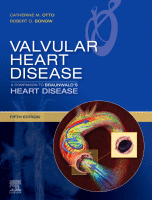Physical Address
304 North Cardinal St.
Dorchester Center, MA 02124

Key points Pregnancy increases cardiac output and intravascular volume, which increases gradients across stenotic lesions and can exacerbate heart failure in patients with severe valvular stenosis. Intravascular volume increases in the immediate postpartum period, and high-risk patients require 48 to…

Key points The choice of surgical valve replacement or transcatheter valve-in-valve (VIV) implantation for bioprosthetic valve failure depends on careful consideration of patient characteristics and surgical valve and anatomic parameters by a multidisciplinary heart valve team. Clinical outcomes after a…

Key points The need for heart valve replacement surgery marks a major milestone in the natural history of valve disease and mandates establishment of a schedule for clinical and echocardiographic surveillance. Surgical repair, especially for primary mitral regurgitation, is preferred…

Key points Congenital valvular pulmonic stenosis (PS) that is mild in severity is well tolerated and has a benign natural history. Balloon angioplasty is the first-line treatment for severe valvular PS, especially for doming pulmonic valves. Double-chambered right ventricle is…

Key points Tricuspid regurgitation (TR) is most frequently functional, not related to primary tricuspid leaflet pathology but secondary to another disease process that produces right ventricular dilation, distortion of the subvalvular apparatus, tricuspid annular dilation, or a combination of these.…

Key points Mitral regurgitation (MR) and mitral stenosis (MS) may result from abnormalities of the mitral valvular complex—leaflets, annulus, chordae, and papillary muscles—and the left atrium and ventricle. Intraoperative echocardiography is a vital diagnostic technique for mitral valve (MV) surgery…

Key points The field of structural heart disease interventions is expanding rapidly. Advances in cardiac imaging are playing a central role in patient selection, imaging guidance, and follow-up of patients undergoing transcatheter mitral valve procedures (TCMVPs). Three-dimensional transesophageal echocardiography has…

Key points The risks of surgery for severe mitral regurgitation (MR) in elderly patients and those with medical comorbidities, particularly with consideration of patient preference for quick recovery, have stimulated attempts to develop less invasive solutions. Unlike the extensive toolbox…

Key points The mitral valve is a complex, three-dimensional assembly of independent anatomic components, including the annulus, leaflets and commissures, chordae tendineae, papillary muscles, and left ventricle. Abnormalities (lesions with etiologic implications) in any of these components may cause alteration…

Key points Grading of mitral regurgitation (MR) severity by echocardiography should not be based on visual inspection of the color Doppler MR jet, but rather on integration of multiple qualitative and quantitative parameters. Secondary MR is dynamic, changing during systole…